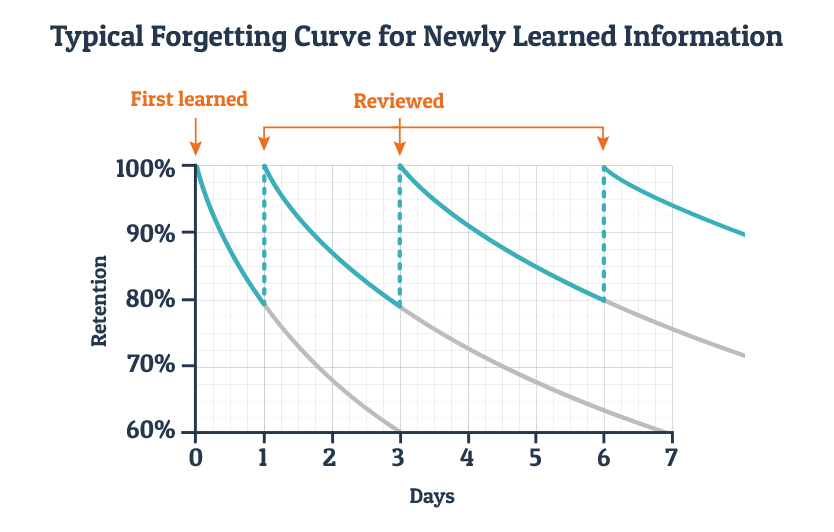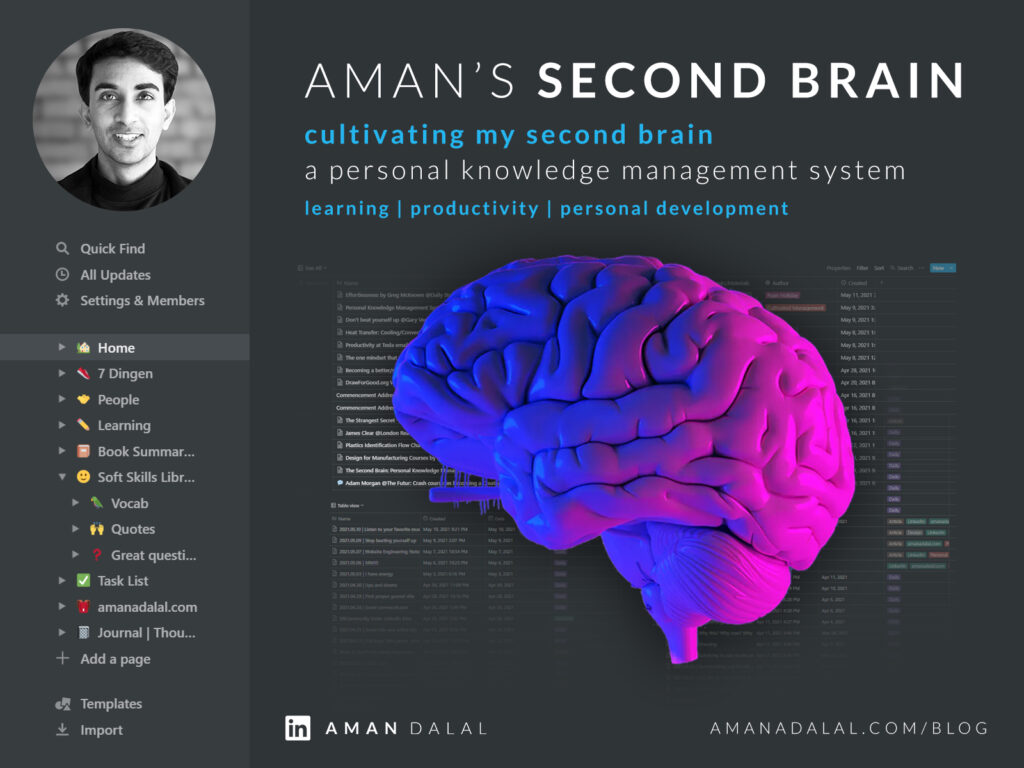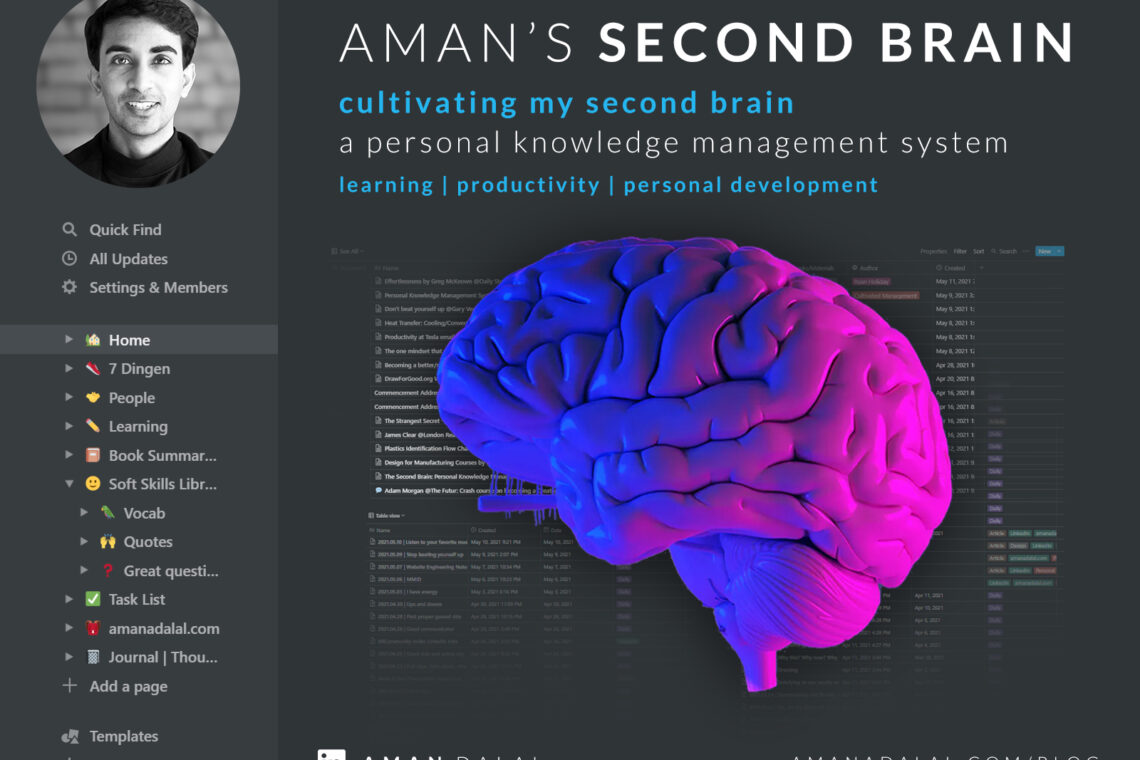cultivating my second brain: a personal knowledge management system for learning, productivity, and personal development
July 15, 2021
1. Origin story: the “Why?”
Books, podcasts, articles, lectures, people, YouTube, SkillShare, countless sources that we get our information from every single day. We like to expand our knowledge about work and academic topics. We like to grow our skillset. We learn about fascinating and unique things that we’ve never heard about before. Information that we obtain can truly add value to our future self and work, help us become a better person, make the most of our education and ‘e-consumption’, and let us have better conversations and connect with people.
But does it?
Do we retain all the information we consume? ‘All’ is probably overkill. Do we retain a significant portion of it?
For me, the answer was “No”. Innumerable hours spent listening to podcasts, reading non-fiction, watching so-called informational YouTube to learn about interesting topics. More often than not, these specific topics that I learn about did not come up in daily conversation. If I share them and talk about them, after a while they fade away. Or sometimes my purpose is to improve my knowledge on a certain academic topic without knowing exactly when it could be useful in the future.
Say it would be handy to know about topic X after Y months when I am working on project Z. If I define X to start with, there are still two variables that are in the dark. How do I make the most of all my “personal development”?
This is why I started asking myself the question, “Is there a better way to consume content and learn, be able to retain information longer such that it is actually useful and adds value to my life and work?” This is the “why” I’m cultivating my second brain.
What is the second brain? I’ll come to that in a minute.
2. How did I get to this method: The “How?”
How do I handle my frustration with information overload? How can I answer my problem with a potential solution? Keep reading.
Making a start: Cutting down and prioritizing
I made a decision to be more conscious about what content and information I consume. When I do consume, I would like to be able to retain it.
I wanted to consume “less but better”, “Quality over quantity”, “Less is more.” I decided to apply these ‘design principles’ to the way I learn and grow.
For instance, instead of listening to hours of podcasts mindlessly while doing chores, I started listening to say a half an hour a day, but with more focus. I made sure that I make a summary of my takeaways from what I listened to each day. Instead of watching fascinating videos that I like about cool engineering and design ideas, I watched just one but then I spent time taking screenshots and noted down some learnings.
Making it useful without overloading myself
After having started to take notes about the content and knowledge I consume, I see that I’m consuming much less than before. But I’m consuming in a better way. I’m consuming most likely only when I know I have the time and energy to take notes. I would have these notes so whatever I gather is not lost over time. I like it this way compared to overloading myself with information and media content day and night. Moreover, when I write things down and see visuals, I internalize and learn them better.
Focus on future use
The idea wasn’t to take notes from ‘all’ the content I watch, read, or listen to. But to note down ‘takeaways’ when there are any. These could be short or long pieces of information I see myself wanting to refer to again in the future. If I’m reading an interesting paragraph or come across a nice quote, it could just be a copy of that stored in my database.
The information that I store is refined from the ocean of information out there. When I summarize my learnings, they are usually quite concise compared to the original content. Details are added when appropriate but all in all, I try to keep everything at a certain quality. If I don’t instantly QC it while making notes, I do it later when I have the time for refining it.
This personal informal QC makes the information future proof. Being of a certain quality, I’m confident that when I read it again months (or possibly years) later, I still know what I was thinking back then.
Strategic revision for retention
That brings me to revision and retention. I don’t want to fire up my laptop every time I want to talk about a certain topic I have read about in the past. The holy grail would of course be to imbibe all the information in this database to my mind such that I have instant recollection of it. But that is a difficult step. I do not have photogenic memory or infinite revision time. And that’s where strategic revision could play a key role.
Since all this information is lying in my second brain and I use it so actively, I come across various notes here and there. For certain skill-related or academic topics, I intentionally go and skim through notes from time to time (also improve them if needed), and add the number of ‘revisions’ I’ve been through on each topic for record-keeping. Some call a certain technique of doing revisions ‘spaced repetitions‘. This is when you refer to newly learned information at a time interval that roughly doubles between every two consecutive intervals. People have experienced that this helps retain information remarkably longer than without such strategic repetition.

3. However, what is the “second brain” after all?
I used this term several times above. But what do I mean?
My second brain is a searchable collection of ideas, thoughts, learnings, book/podcast summaries, articles, pictures, and any other type of information I come across and find worthy of noting down, a database built up and maintained over a long period of time.
A collection
All the content in the second brain is in one place. I use one platform to build a library and organize different kinds of information. The platform “Notion” is my tool of choice. It is a note-taking platform with the ability to nest pages inside pages, plenty of different useful templates for meeting notes, calendar/journal entries, tabular formats, habit tracking, etc. that helps me structure information just the way I like it. I call it a library, database, or second brain almost interchangeably. I use Notion, some like Roam Research, or something simpler like Evernote. The tool is almost irrelevant and the habit + motive is what matters.

Easily searchable
This is the key factor that makes the second brain so powerful. All the information I store is instantly searchable. Say I’m writing an article about “virtual reality”. If I put that as a search entry in my second brain, I’m reminded about all the online resources I’ve referred to about the topic, the time that someone’s mentioned something interesting about VR in a meeting, and related content I’ve created in the past about that. Another example is: suppose I need information about injection molding the polymer called ABS. I’ve had great tips and tricks about this in university lectures and discussed this in several meetings with colleagues. If I’m going to talk to a client about this soon, I could simply search for ABS injection molding and in a few minutes refresh my knowledge about best practices and tips & tricks for this method of manufacturing for this particular plastic, and be well-prepared for the meeting. I could of course go to new online resources on the topic. But if I ‘revise’ exactly the things I knew or learnt in the past, I have a better chance of learning them more strongly and retaining them longer. I would very much like that! Again it comes down to high-quality retention of information particular to myself over quantity and boatloads of information spread across the interwebs!
Fleeting notes
Another application for a second brain is fleeting ideas that come to me, eg. on a walk or in the shower. I wasn’t used to having a system of collecting these random gems, findings, insights that come to me when I’m not actively thinking about them. With a second brain, I am closer to putting them all in one place and access them again later when more appropriate.
“My brain is great at coming up with ideas but not so great at remembering them.”
Brick by brick, making a tower
I like how Ali Abdaal put it, “slow burns instead of heavy lifting.” I’m the kind of person who can vouch for incremental build-up of knowledge over a long period of time. Making a tower, brick by brick, with a strong foundation. Slowly building up a knowledge bank can work wonders. I don’t believe in moving mountains overnight and would always go for the more patient but attested way. In the concept of the second brain, I wish to collect gems of information and takeaways from reading, watching, and listening from various places. They don’t have to be massive and complete notes on those topics but can only be the crux of the matter.
Hierarchy and categorization
Hierarchy helps me organize information. I have different high-level pages for different types of content I gather, eg. Learning, Journal entries, Meetings, Book summaries, Quotations, etc. Within each of these pages, there are tables which have entries (which are pages on their own) with a title, category tags, author tags, date, no. of reviews, etc. Whatever categories or tags that are relevant for the particular type of content. These tags help filtering and finding entries when necessary. Eg. If I want to view all my LinkedIn articles then I can filter ‘on’ the tag for LinkedIn articles. However, I have kept it quite simple until now and not implemented bi-directional linking which means pages can be interconnected in both directions, but may consider it in the future.
4. Promising future, smarter me
Taking notes is not an original idea. Making an online database that is instantly searchable, also not.
I wish I would’ve come across this idea sooner so that I would’ve already gathered a good amount of information and insights from the past years which could’ve been valuable to refer to today! However, I don’t think it is too late. I have been very excited about this practice since I started it 1-2 months ago. I’m already seeing some practical benefits similar to the examples I mentioned above in the article.
- I feel it is boosting my creativity by letting me remix pieces of information I learn here and there.
- It makes me more accountable to practicing what I learn since I can refer to it instead of losing it.
- I am consuming lesser content and gathering less knowledge than before but with a much higher focus. I no longer feel the need to learn something all the time and am not overloaded/overwhelmed by information. I am significantly more conscious about things I put in my mind and second brain, just like some would be conscious of what they eat.
- I am able to refer to academic/theoretical topics that help me revise my engineering and design knowledge and apply these more in practice.
- Journaling regularly allows me to clear my mind and helps me practice what I preach. This very article is a composition of my insights in my journal or learning entries in the past couple of months.
I’m very curious to find out what this database would look like at the end of 2021 and beyond. I’m always happy to learn and grow myself and this practice provides me a structured way of doing that. Hope you learnt something new after reading this and if you relate to the sense of information overload and low retention that I felt, maybe something like the second brain is for you too!

